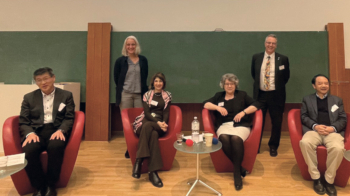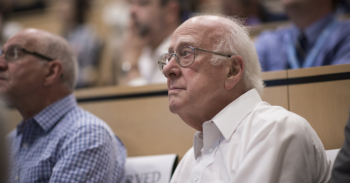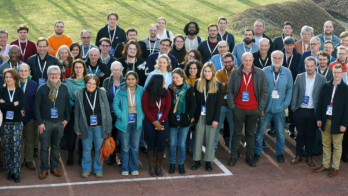Rolf Heuer talks about his long-term vision for CERN.
Rolf-Dieter Heuer is no stranger to CERN. He first joined the laboratory’s staff in 1984 to work on the OPAL experiment at LEP. Nor is he a stranger to top-level management in particle physics. Having been spokesman of the 330-strong OPAL collaboration from 1994, he took up a professorship at the University of Hamburg in 1998 and became research director for particle physics and astrophysics at DESY in 2004. For the past 10 years he has steered DESY’s participation in projects such as the LHC and a future international linear collider. He has also fostered the restructuring of German particle physics at the high-energy frontier. Now he faces new challenges and new opportunities as he takes over the reins at one of the world’s largest scientific research centres.
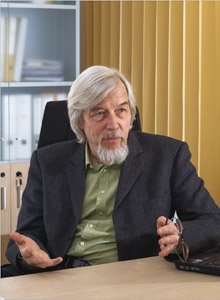
As Heuer begins his five-year mandate as CERN’s director-general the first goal is clear: to see LHC physics in 2009. The immediate priority is to repair the machine following the damaging incident that occurred soon after the successful start-up last September. Heuer recalls how smoothly the machine operators established beam on 10 September, with the experiments timing in on the same day (CERN Courier November 2008 p26). “This was a big success,” he asserts. “When you look back to LEP, it’s amazing how fast it went.” For Heuer, the start up demonstrated not only that the LHC works, but that it works well. “The LHC as a project is now completed,” he adds. In his view, the repairs underway are part of the continuing commissioning process and he has full confidence in the team to have the LHC operating again as expected later this year.
A machine for the world
Longer term, Heuer’s vision for CERN stretches to horizons beyond the LHC, not just in time but also in terms of the broader particle-physics arena. This wider view includes several aspects with a common underlying theme of communication, from external relations with other high-energy physics laboratories to the transfer of technology and knowledge to society. One of his first acts as director-designate was to propose a management structure that includes a highly visible external relations office. This is to be a conduit for communication with laboratories and institutes not only in CERN’s 20 member states but also in the other nations with which the organization has relations at one level or another.
Another way in which CERN reaches beyond its boundaries as a centre for particle physics is through knowledge and technology transfer (KTT). Here Heuer believes that there should be more emphasis on knowledge, which he feels has not been sufficiently exploited in the past. He stresses that the goal should not primarily be potential funding, but to make a big impact on global society. “It’s great to have additional funding, but that should be secondary. It’s not funding that should drive KTT” he says.
The LHC will be the world machine for many years
Rolf Heuer
However, Heuer’s most ambitious – and perhaps contentious – goals are arguably his aspirations for CERN positioned as a laboratory for the world. In some respects that process has already begun. “We are about to enter the terascale in particle physics,” he says. “The LHC will be the world machine for many years.”
A first priority will be to strengthen CERN’s intellectual contribution, so that it has a role beyond that of a service laboratory. “CERN has to provide a service,” Heuer explains. “But to provide the best results we need the best people and therefore there needs to be an intellectual challenge.” A first step will be to create a new centre at CERN for the analysis and interpretation of LHC data. The idea is to create close contact between staff and users, between experiment and theory. “It should be a focal point in addition to other centres,” says Heuer. In particular, he envisages “a centre that fosters open discussion between theorists and experimenters, where people can discuss and perhaps develop common tools”. He acknowledges that it will be a challenge, but as he says: “I want to challenge people.”
A global view
Out on the broader world stage, Heuer hopes to influence the current panorama in particle physics. He believes that it is important to combine the strengths of the particle-physics laboratories around the world and to co-ordinate the various programmes. In general, “we need breadth with coherence”, he says. Starting at home, there are plans for a workshop on “New Opportunities in the Physics Landscape at CERN” in May to look at the future for fixed-target experiments at the CERN.
In this context, breadth also means to venture beyond the conventional boundaries of particle physics, particularly to overlaps with astroparticle physics and nuclear physics, where there are common aspects of experimental methods and theoretical ideas. “We need a closer dialogue with other communities,” he explains. “We should not separate fields too much. There are differences but we should emphasize the commonalities and aim for a ‘win–win’ scenario.”
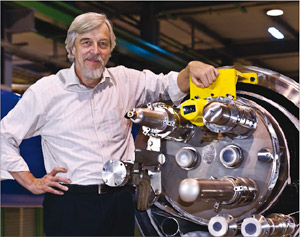
Co-operation and collaboration are key words in Heuer’s view. “High-energy physics facilities are becoming larger and more expensive,” he points out, “and, to state it positively, funding is not increasing.” However, long-term stability in funding is going to be a necessary condition for the future survival of the field. “We need new approaches from funding agencies,” he says, “which look beyond national and regional boundaries.” One step could be for funding agencies to meet on a more global basis. Here the CERN Council provides a model that these agencies are already studying for, as Heuer notes, “it seems to work”.
More generally, keeping particle physics and CERN on track for a fulfilling future will no doubt require an organizational form that has yet to be defined. “We need to be open and inventive,” says Heuer. “A key word is partnership.” He argues that it will be crucial to retain excellent national and regional projects in addition to global initiatives to maintain expertise world wide; for example, he believes that it is essential to have accelerator laboratories in all regions.
“May you live in interesting times” is a supposedly a curse, but taken at face value it could also be a blessing. CERN, and Heuer as director-general, are certainly experiencing interesting times. The hope at CERN and in the wider particle-physics community must be that the future is not only interesting but global and bright.



